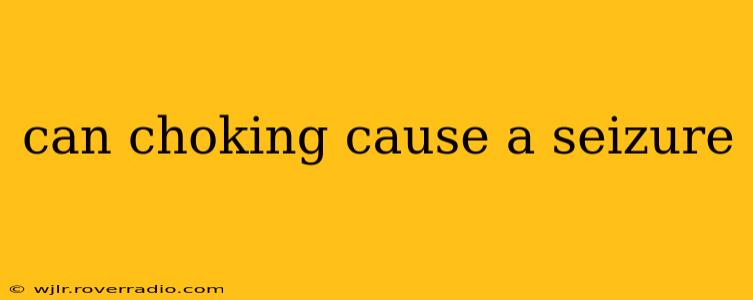Can Choking Cause a Seizure? Understanding the Connection
Choking, a serious condition where the airway is blocked, and seizures, sudden bursts of uncontrolled electrical activity in the brain, are distinct medical events. While they don't directly cause each other, there's a complex relationship worth understanding. A choking episode can, under specific circumstances, trigger a seizure, or the symptoms of one, but it's not a guaranteed outcome. Let's delve into the details.
How Choking Can Lead to Seizure-Like Symptoms
The brain relies on a constant supply of oxygen-rich blood. When choking occurs, the airway obstruction restricts oxygen intake. This oxygen deprivation (hypoxia) can significantly impact brain function. Severe hypoxia can lead to a range of neurological consequences, including:
- Loss of consciousness: This is a common symptom of both choking and seizures, but the underlying causes differ. Choking causes loss of consciousness due to lack of oxygen, whereas seizures cause it due to abnormal brain activity.
- Convulsions or jerky movements: Severe hypoxia can mimic the motor symptoms of a seizure, leading to uncontrolled muscle spasms or jerking. However, these movements are a direct result of the body's desperate attempt to get oxygen to the brain, not abnormal electrical activity.
- Altered mental status: Confusion, disorientation, and other cognitive impairments can occur after a choking episode due to lack of oxygen to the brain. These symptoms are also present in some types of seizures.
It's crucial to differentiate between seizure-like symptoms caused by choking and actual seizures. A true seizure results from abnormal electrical activity in the brain, whereas the symptoms mimicking a seizure during choking stem from oxygen deprivation.
What Happens to the Brain During Choking?
During choking, the lack of oxygen leads to a reduction in blood flow to the brain. This can cause temporary brain damage if the airway obstruction isn't quickly resolved. The longer the choking episode lasts, the greater the risk of significant neurological consequences. This brain injury, though temporary in many cases, can trigger abnormal electrical activity, potentially resulting in a seizure. However, this is an indirect consequence of the choking, not a direct causal link.
Can a Seizure Cause Choking?
While less common, a seizure can sometimes lead to choking. This often occurs if the seizure causes:
- Loss of consciousness and relaxation of the throat muscles: This can partially or completely obstruct the airway, leading to choking.
- Excessive saliva or vomit: During a seizure, involuntary muscle contractions can cause excessive saliva or vomit to accumulate in the throat, potentially causing choking.
Differentiating Choking from a Seizure: Key Differences
It's vital to distinguish between choking and a seizure. While symptoms can overlap, crucial differences exist:
| Feature | Choking | Seizure |
|---|---|---|
| Cause | Airway obstruction | Abnormal electrical activity in the brain |
| Onset | Sudden, often related to swallowing/eating | Sudden, without a clear trigger (often) |
| Symptoms | Cyanosis (blue discoloration of skin), gasping, inability to breathe, coughing | Loss of consciousness, convulsions, staring spells, altered mental status |
| Duration | Varies; immediate intervention is critical | Varies; can last seconds to minutes |
What to Do If Someone Is Choking
Immediate action is vital when someone is choking. Perform the Heimlich maneuver or other appropriate first aid procedures. If the choking episode leads to loss of consciousness or seizure-like symptoms, call emergency medical services immediately.
Seeking Medical Attention
After any choking episode, even if seemingly mild, it's advisable to seek medical evaluation. This helps rule out any underlying medical conditions and assess for potential long-term effects. Similarly, anyone experiencing recurrent seizures needs thorough medical assessment.
In conclusion, while choking can lead to seizure-like symptoms due to oxygen deprivation, it doesn't directly cause a seizure in the same way that abnormal brain activity does. Understanding the distinction is crucial for appropriate first aid and medical management. Always seek immediate medical help for any suspected choking or seizure.
